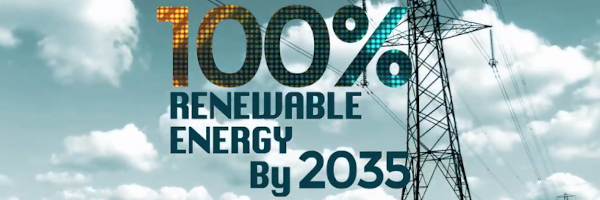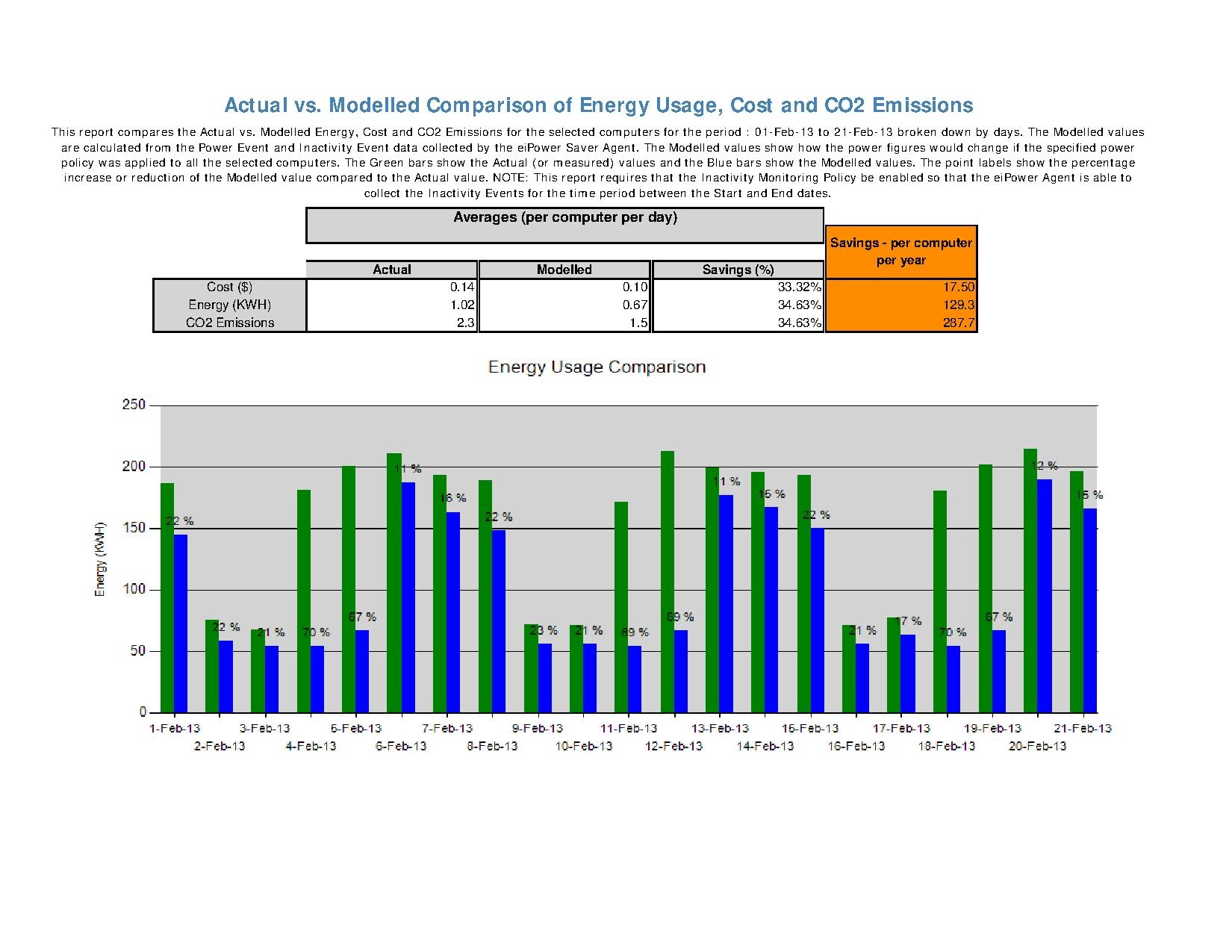Global High Impact Energy Efficiency
| Global High Impact Energy Efficiency | |
|---|---|

| |
 100% Renewable by 2035 | |
| Team Organizations | Enterprise Infrastructure Partners |
| Team Leaders | Joe D'Agostino |
| Participating Municipalities | San Diego CA |
| Status | Launched |
| Document | 
|
Description
Objectives:
- kWh usage, cost, and carbon emission savings by managing power on computers without impacting user productivity, or IT maintenance via software IOT sensor
- Savings significantly impacts all Sustainability Plans with energy efficiency, Carbon Emission reductions, and kWh aversion. Scalable on a Global basis.
- No Cost, minimal effort POC to show savings using real data from the prospect’s environment.
- Minimal impact on IT schedules, savings in under 90 days.
Challenges
Cities are striving to meet the goals of well-defined sustainability plans by leveraging effective solutions such as LED street lighting, building retrofits, and other energy efficiency projects. Cities can now leverage high energy efficiency savings that is often overlooked, and always misunderstood – computer power management.
Solutions
eiPower Cloud Services significantly reduces kWh usage, cost, and carbon emissions by easily, and effectively managing of desktop and laptop computer power, resulting in savings in under 90 days. Many municipal IT departments believe they have addressed this with Group Policy Objects and vendor power scheme utilities. Our application proves these utilities to be unreliable and unable to quantify kWh, carbon, and cost savings. Using eiPower, organizations can safely, and simply eliminate wasted electricity, reduce the cost of doing business, and impact environmental Sustainability plans.
Major Requirements
- Conduct a 1-hour presentation including all stakeholders, reviewing why computer power management is lucrative for municipalities, expected results, introduce benefits of Proof of Concept, answer questions.
- Send software IOT sensor to customer to conduct preliminary testing on test computers. Email screen shots of their computer records from the Cloud Server. Have organization identify 250 computers that represent everyday business use that will receive the IOT sensor for the POC.
- Deploy IOT sensor, and gather data for 21 days. IOT sensor does not change desktop setting or interfere with user productivity. During that time receive electricity pricing and assign computer wattage values. Schedule POC review meeting.
- Review results with organization, centering on sustainability plan impact. Provide costs, break even, savings, and ROI spreadsheet for full implementation
Performance Targets
| Key Performance Indicators (KPIs) | Measurement Methods |
|---|---|
|
Depending on the number of computers, and the price of electricity the following KPIs, found in all City Sustainability Plans, can be realized:
|
eiPower calculates kWh usage, cost, and carbon emissions savings with a variety of reports. These reports can be published to authenticate progress toward sustainability goals, and cost savings to the City. Our application is accepted by every utility company in the US as a feasible way to reduce power, and garner a one time rebate for using the product. |
Standards, Replicability, Scalability, and Sustainability
- Standards: Our IOT sensor is a standard, familiar MSI file that installs similar to any application IT departments use routinely. It uses a standard SSL certificate to securely communicate only to the server and the server ONLY communicates with the agent. All communications are initiated from the agent. Our application does not require any IT infrastructure changes, and uses all standard networking ports.
- Replicability: Using the same simple deployment processes. eiPower Cities can extend eiPower savings beyond municipal buildings to school districts’, and counties. Our product is the simplest way to realize Smart City Sustainability goals and Energy Efficiency Savings.
- Scalability: eiPower is an IOT application, capturing small amounts of data from many devices. The computing power to accomplish this is minimal. Additionally, our server application can be multi-hosted to keep Cities, departments, schools, and counties distinct. The power of the Cloud enables eiPower to serve hundreds of thousands of computers globally.
- Sustainability: eiPower reduces kWh consumption, thus reduces power from carbon plants, or reduces the amount of storage and generation for renewable energy infrastructures. Energy efficiency, carbon reduction, and energy savings are all part of Cities Sustainability plan.
Cybersecurity and Privacy
- eiPower only transmits power event data, such as on/off/hibernate/standby. These power states, are coded and can ONLY be sent to the server via SSL. No personal data, keystrokes, or tracking is collected. There is no server-initiated communication, it is all done from the agent. The IOT sensor can ONLY exchange data with the server, the server can ONLY exchange data with the IOT sensor.
- The IOT sensor cannot be modified or spoofed as it is signature is signed with an SSL certificate.
- Finally, if the user modifies computer power schemes, they are changed backed immediately instead of the next reboot, or login.
Impacts
Economic benefit can be realized in under 90 days and has the potential to deliver kWh, cost, and carbon savings similar to a street light retrofit project. The difference is our product delivers results faster, with less disruption, and far less expensive. It is up to the City to redeploy these savings to a variety of municipal projects.
- Reduction in carbon and kWh conforms to all City Sustainability plans. Sustainable City progress, attracts educated millennials, which attract companies, resulting in hiring, more housing, and a vibrant community.
- Reduction in kWh means less renewable infrastructure required. Existing resources can be applied to other electrification projects such as EV, and building electrification.
- Using eiPower, conforms to different state requirements of measuring electricity consumption in buildings. (Title 24 in CA) It goes beyond vendor utilities, and hardware monitors by reducing power, and reporting consumption.
Sample Municipal Benefits Summary:
- City Manager, or CFO – Reduces the cost of government by reducing wasted electricity on City Computers.
- Facilities Manager – Measured on reducing power consumption in City Facilities.
- Sustainability Manager – Benefits by reducing carbon emissions to meet City mandates
- IT Manager – Can leverage features such as waking computers without WOL to make missions critical functions 100%more effective.
Demonstration/Deployment
(below process describes the POC Pilot and Implementation Deployment)
- City agrees to no cost Proof of Concept Proposal.
- EIP sends IOT sensor for installation on a few test computers, City and EIP monitor for exceptions.
- City deploys to approximately 250 computers, and IOT sensor captures data for approximately 20 days. IOT sensor does not change desktop settings. It simply acts as a software monitor to measure when the computer could go into low power mode.
- During the data collection, City provide electricity rates for winter and summer seasons, to calculate energy costs and savings.
POC Deliverables:
- Sample of POC Report
- A ROI spreadsheet will also be presented, showing savings per computer, acquisition costs kWh, and carbon savings. It is key to show when the City will make their investment back (usually in under a year), energy cost savings, and ROI over 3 years.